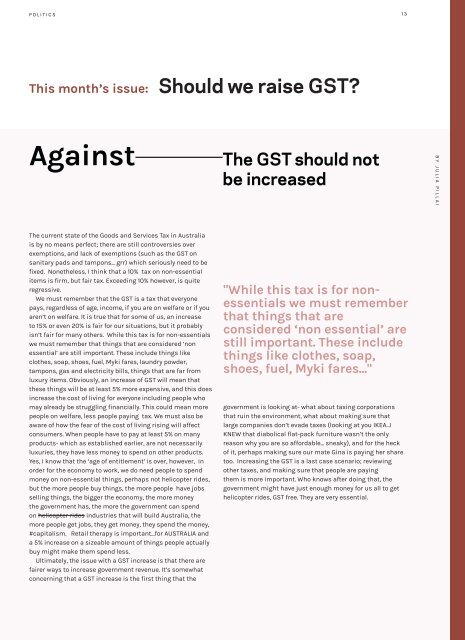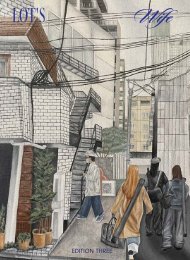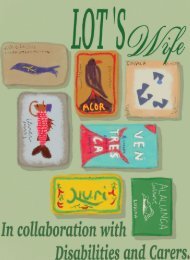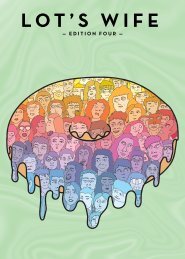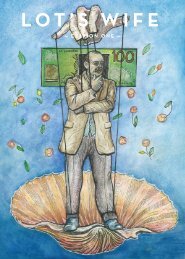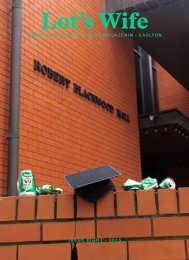Lot's Wife Edition 6 2015
Create successful ePaper yourself
Turn your PDF publications into a flip-book with our unique Google optimized e-Paper software.
POLITICS 13<br />
This month’s issue:<br />
Should we raise GST?<br />
Against<br />
The GST should not<br />
be increased<br />
BY JULIA PILLAI<br />
The current state of the Goods and Services Tax in Australia<br />
is by no means perfect; there are still controversies over<br />
exemptions, and lack of exemptions (such as the GST on<br />
sanitary pads and tampons... grr) which seriously need to be<br />
fixed. Nonetheless, I think that a 10% tax on non-essential<br />
items is firm, but fair tax. Exceeding 10% however, is quite<br />
regressive.<br />
We must remember that the GST is a tax that everyone<br />
pays, regardless of age, income, if you are on welfare or if you<br />
aren’t on welfare. It is true that for some of us, an increase<br />
to 15% or even 20% is fair for our situations, but it probably<br />
isn’t fair for many others. While this tax is for non-essentials<br />
we must remember that things that are considered ‘non<br />
essential’ are still important. These include things like<br />
clothes, soap, shoes, fuel, Myki fares, laundry powder,<br />
tampons, gas and electricity bills, things that are far from<br />
luxury items. Obviously, an increase of GST will mean that<br />
these things will be at least 5% more expensive, and this does<br />
increase the cost of living for everyone including people who<br />
may already be struggling financially. This could mean more<br />
people on welfare, less people paying tax. We must also be<br />
aware of how the fear of the cost of living rising will affect<br />
consumers. When people have to pay at least 5% on many<br />
products- which as established earlier, are not necessarily<br />
luxuries, they have less money to spend on other products.<br />
Yes, I know that the ‘age of entitlement’ is over, however, in<br />
order for the economy to work, we do need people to spend<br />
money on non-essential things, perhaps not helicopter rides,<br />
but the more people buy things, the more people have jobs<br />
selling things, the bigger the economy, the more money<br />
the government has, the more the government can spend<br />
on helicopter rides industries that will build Australia, the<br />
more people get jobs, they get money, they spend the money,<br />
#capitalism. Retail therapy is important...for AUSTRALIA and<br />
a 5% increase on a sizeable amount of things people actually<br />
buy might make them spend less.<br />
Ultimately, the issue with a GST increase is that there are<br />
fairer ways to increase government revenue. It’s somewhat<br />
concerning that a GST increase is the first thing that the<br />
"While this tax is for nonessentials<br />
we must remember<br />
that things that are<br />
considered ‘non essential’ are<br />
still important. These include<br />
things like clothes, soap,<br />
shoes, fuel, Myki fares..."<br />
government is looking at- what about taxing corporations<br />
that ruin the environment, what about making sure that<br />
large companies don’t evade taxes (looking at you IKEA...I<br />
KNEW that diabolical flat-pack furniture wasn’t the only<br />
reason why you are so affordable... sneaky), and for the heck<br />
of it, perhaps making sure our mate Gina is paying her share<br />
too. Increasing the GST is a last case scenario; reviewing<br />
other taxes, and making sure that people are paying<br />
them is more important. Who knows after doing that, the<br />
government might have just enough money for us all to get<br />
helicopter rides, GST free. They are very essential.


